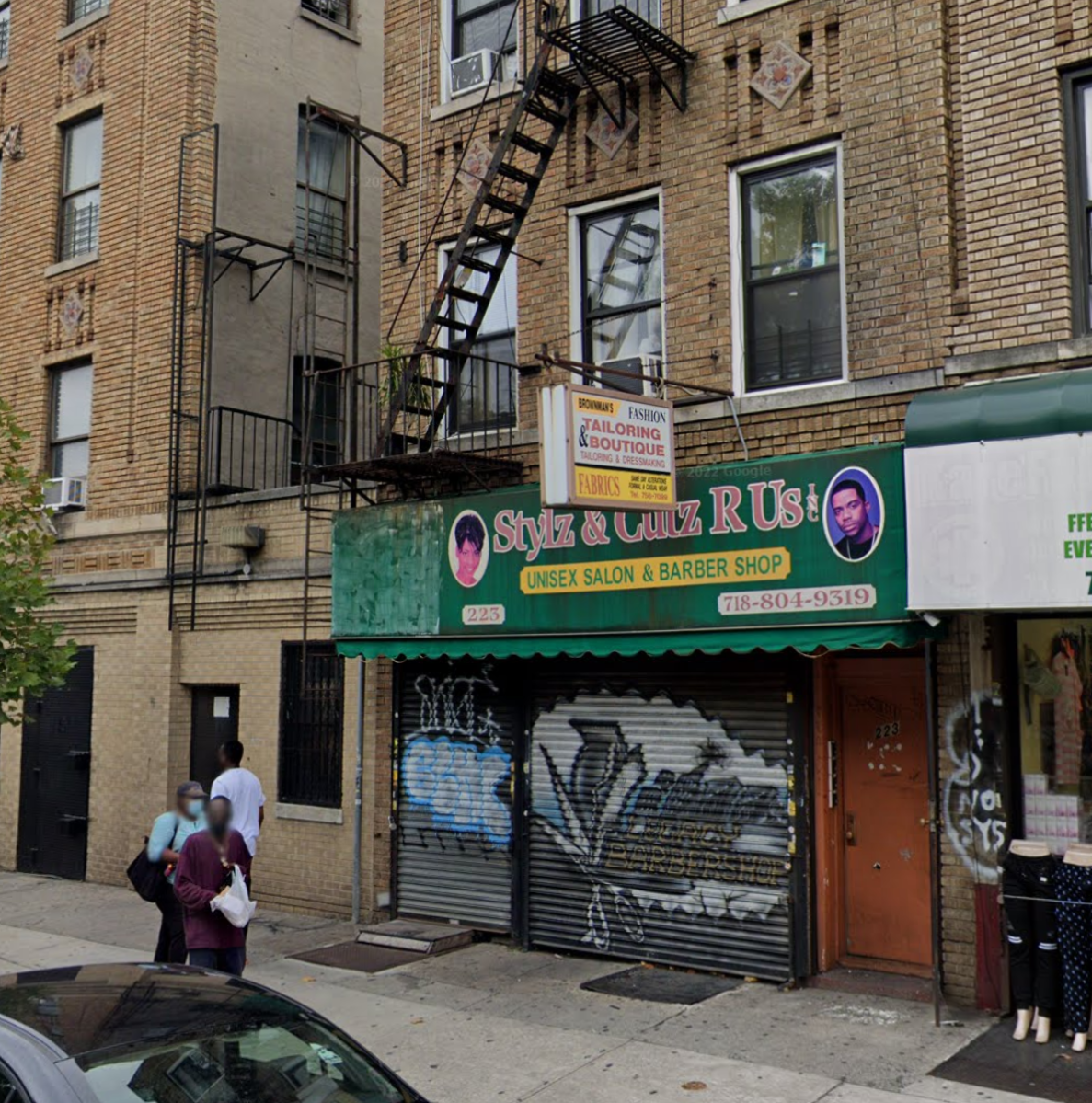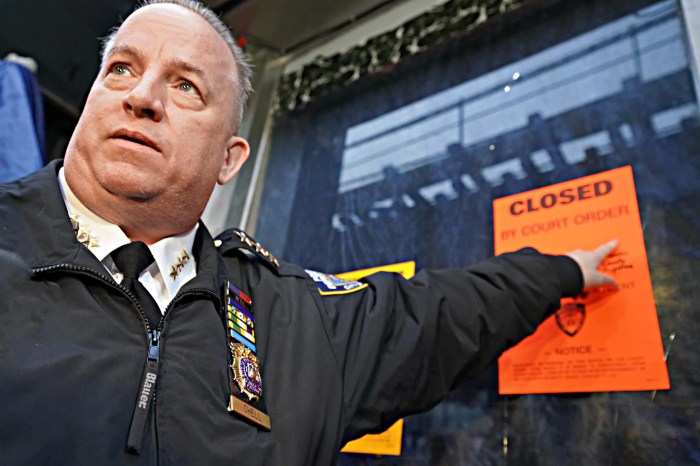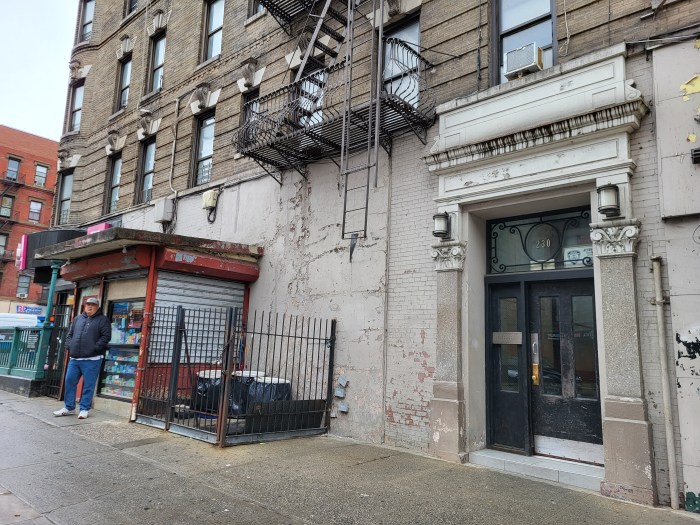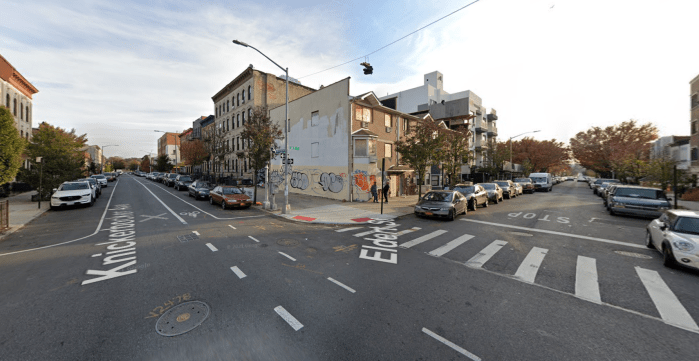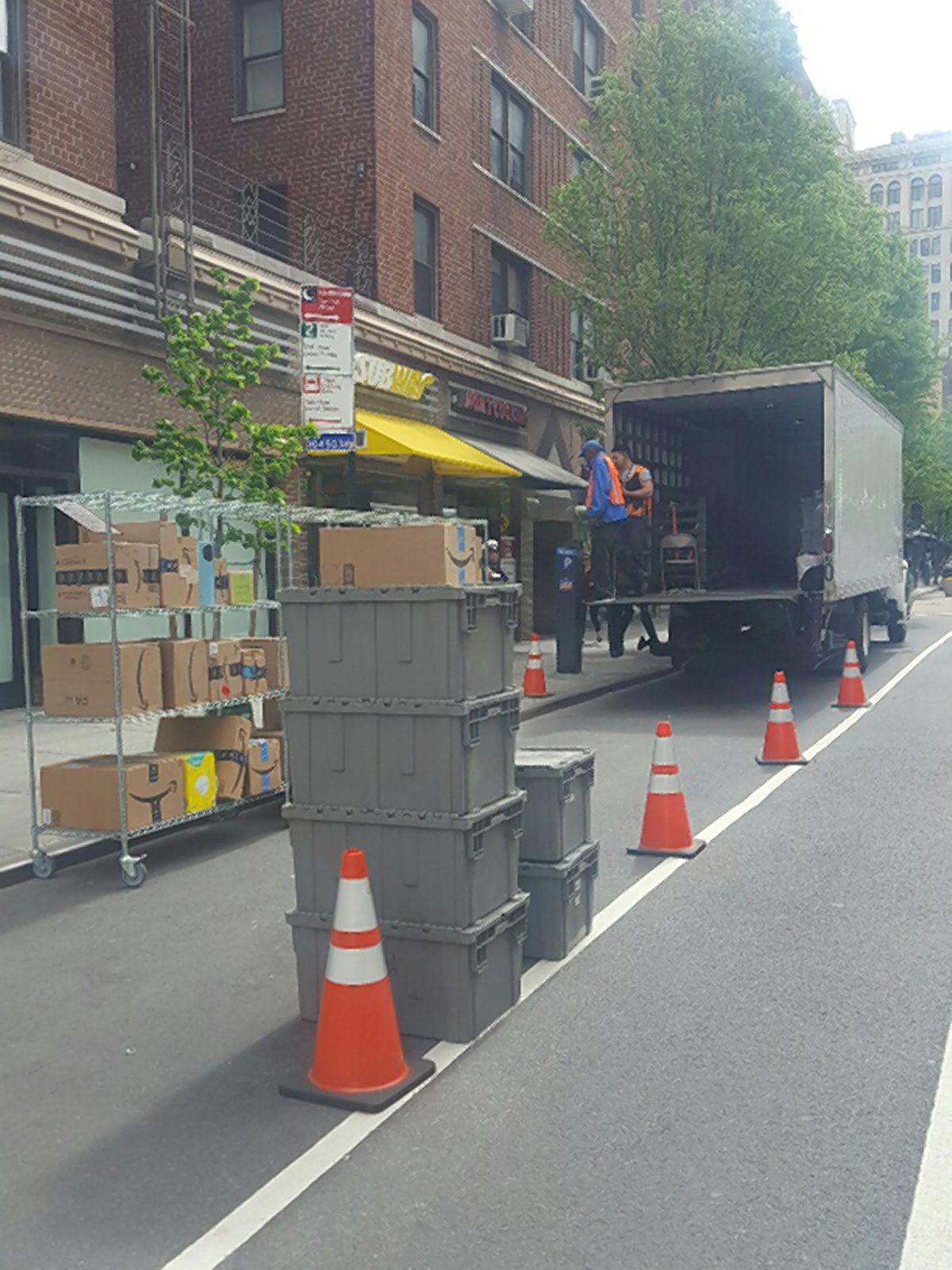
BY MARY REINHOLZ | There’s a nonunion crew of truckers and delivery people showing up in large unmarked vehicles around Union Square and other Downtown neighborhoods with increasing frequency.
These are contract workers carrying packages from Amazon, the Seattle based e-commerce behemoth known for its grueling work ethic. The workers spend long hours parked on metered city streets. Police have ordered them to move from two locations after receiving complaints from residents, merchants and the Village Alliance Business Improvement District, which alerted this newspaper to their curbside activities. Rival brother truckers have also noticed their M.O.
“These guys have huge trucks and they take up practically an entire block,” a UPS driver and member of the Teamsters Union told The Villager on Aug. 9 after making a delivery on E. 17th St. “They park, and then about 10 other guys show up and start setting up cones and sorting packages on the street. Sometimes they do it under their tents. Then they spread out and deliver to [online] customers in the area pushing a small four-wheel truck” — also known as a dolly. “Sometimes they are there for hours,” the UPS driver added, noting that by contrast, he generally leaves a spot “within 20 minutes.”
The outfit the UPS driver described is a New York-based trucking and freight-shipping company called Cornucopia Logistics, which is based in the One Grand Central Plaza building, at 60 E. 42nd St., but has warehouses in New Jersey and recently posted online “help wanted” ads for $13-an-hour delivery drivers in Elizabeth, N.J. Cornucopia was forced last October by New York State Attorney General Eric Schneiderman to pay $100,000 to more than 100 contract workers for Amazon.com as restitution for illegally docking them for lunch breaks they didn’t take and for overtime.
Cornucopia’s corporate parent, Avant Business Services, has a dispatching office in One Grand Central Plaza’s basement, not far from entrances to the trains of Grand Central Station. Ken Daniels, an Avant financial executive, refused last week to discuss the nature of his company’s contract with Amazon or to explain why it allows workers to use city streets as an ad hoc warehouse and distribution hub.
“I don’t have to tell you about the terms of our contract with a customer,” Daniels said. “Ask Amazon.”
This reporter reached Amazon spokesperson Ernesto Apreza and sent him five photos of Cornucopia’s trucks taking up more than two commercial parking spaces on Broadway between E. Ninth and 10th Sts. with workers unloading boxes, some on the sidewalk, from May 3 to June 1. Apreza asked for a list of questions. He received six, one inquiring about Amazon’s arrangement with Cornucopia and what its standards were for contract workers.
Apreza’s response was brief: “We work with a variety of small to medium-sized businesses that provide work opportunities to individuals who deliver packages on behalf of Amazon,” he said in an e-mail. “We will provide feedback directly to the service provider on this matter.”
Cornucupia’s trucks and street sorters have raised hackles at the aforementioned East Village location, disrupting foot traffic and parking, according to Julie Jang, the manager of Jay Nails at 780 Broadway.
“Basically, they park all day,” Jang said, claiming the trucks overstay a three-hour metered parking limit on commercial vehicles imposed by the city’s Department of Transportation. “They load up all the boxes on the street where cars park. They have a canopy when it rains.”
Jang said Cornucopia’s street operation has caused business to drop at the nail salon because “they’re right in front of our store and people passing can’t see our awning. My husband went out and talked to the drivers,” she added. “They went away for a day and then came back again. We tried calling 311 but nothing was done.” She noted, “We also called the company” but to no avail.
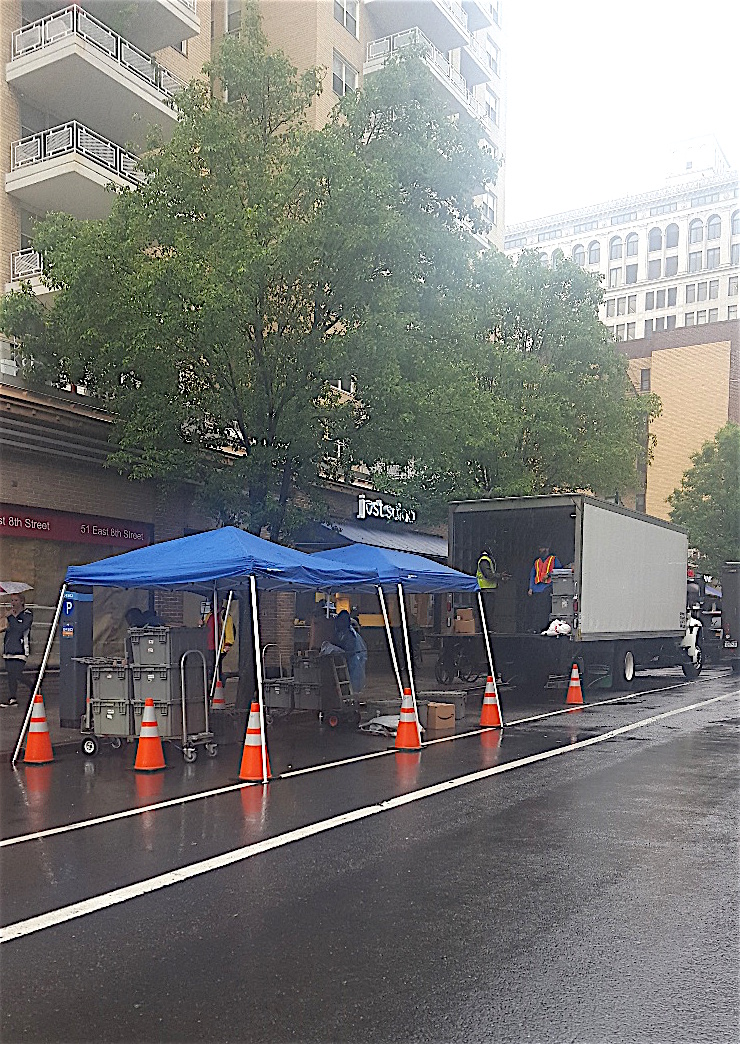
“It’s really awful — you can’t get into the nail store because the boxes are all lined up over the sidewalk, and people have to go to the other side of the street,” said Barbara Ballison, a vice president of property management for Douglas Elliman Real Estate, which is right next door to the nail salon at 774 Broadway. “The [workers] there on the street aren’t rude, but it’s just an insane place to unload.”
Ironically, an officer manager at Elliman said some of its employees receive Amazon packages from the Cornucopia workers. One complained that he couldn’t get a parking space on a Saturday because of Cornucopia’s trucks.
Cornucopia hasn’t been seen on the block recently. Earlier this month, Jason Garcia, a company supervisor at the site, admitted that a New York Police Department detective from the Sixth Precinct’s community affairs office had told the company to leave a previous location at University Place at E. Eighth St. about two months ago.
‘Police aren’t enforcing the three-hour parking limit.’
Martin Tessler
“He gave a warning, stating that if we continued to stay it would lead to a summons,” Garcia said during a phone conversation. “Individuals who were part of a community board had made a complaint. They said we were blocking company signage. It’s a narrow street and our trucks are pretty high. We only have three other trucks and don’t have any [other] problem,” he insisted, noting that Cornucopia trucks have been on Park Ave. “in the high 20s” and on 31st and Lexington. They’ve also been spotted parked on E. 18th St. between Irving Place and Park Ave. South.
Garcia strongly denied that he and his crew are breaking parking regulations.
“If we were parking illegally, we’d be arrested,” he said.
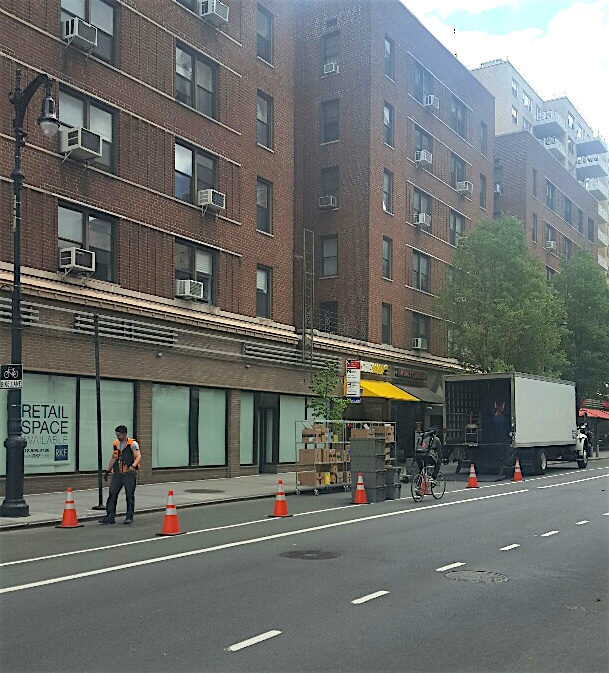
Captain Vincent Greany, commanding officer of the Ninth Precinct, said the trucks have received no summonses but drew complaints “from merchants along Lafayette St. directly and from Village Alliance. Our NCOs [Neighborhood Coordination Officers] visited the delivery trucks and they have since moved. Since they moved, we have not received complaints. The problem is that the trucks probably have set up on another street.”
Martin Tessler, a retired real estate consultant and former member of Community Board 2’s Business and Institutions Committee, has seen the trucks up close and personal from his apartment in the Stewart House, at E. 10th St. near Broadway. He believes they are creating a chaotic citywide problem. Tessler places the blame on Amazon, claiming that the Internet giant is using the contract workers to operate on the cheap because “all they have to do is pay a paltry parking fee.” Amazon, he said, could reduce congestion by renting or buying a building to sort merchandise and then have it delivered in smaller vehicles.
Instead, Tessler claimed in an e-mail, “This problem is accelerating and is attributable to the fact that the third-hour parking limit is not enforced by N.Y.P.D. officers.” Amazon, he continued, has hired trucks that are separate “third-party contractors and are geared to just plugging the meters and thus extending their unloading times that can occupy the several hours. Amazon escapes its need for brick-and-mortar warehouse trucking facilities while at the same time undercutting the exact brick-and-mortar retail stores that are dying off as competition.”
Marc Wulfraat, founder and president of MWPVL International Inc., a supply chain and logistics consulting firm in Quebec, speculated that Amazon may be using the Cornucopia street operation as a “stopgap” or temporary solution “until they get a proper building.” He said the nearly 1-million-square-foot warehouse (called a “fulfillment center”) that Amazon reportedly expects to complete at the end of the summer in Staten Island will be for big, “non-sortable” items, like washing machines, ironing boards and other goods, “that can’t be put in 18-inch boxes.” He noted that Amazon’s warehouse at 7 E. 34th St., established in 2014, “doesn’t have room for trucks to come in.”
One industry source, who asked not to be identified, lambasted Amazon for letting contract workers use city streets for long periods of time.
“They have no right to take public real estate and make it available for their own purposes,” the source said. “People should rise up and do something.”
William Kelley, executive director of the Village Alliance BID — which has compiled a dozen complaints about Cornucopia’s operation — observed that Amazon has made an impact in New York with its popular Amazon Prime free delivery for online customers within two days. “We demand free shipping from Amazon Prime,” Kelley noted. “Anything gets shipped in two days. It’s like Amazon has become a department store for everyone. But there are consequences to that.”
Kelley said he hopes that community boards and New York City councilmembers will take a look at the activity of Amazon’s contract delivery trucks and crews to determine whether “an inordinate amount of space is being used legally” when workers are “setting up pop-up tents, organizing packages and bringing in 10 to 20 people to roll them to their destinations. Should this be free or should [companies] have to pay for that? Shouldn’t there be standards?
“This is happening in multiple East Village locations and in Williamsburg,” Kelley added. “I don’t know if it’s the same company, but this is not going away and it should not be happening to the detriment of brick-and-mortar businesses.”









